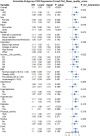The impact of sleep quality on asthma incidence in middle-aged and older adults: evidence from a prospective cohort study
- PMID: 40823227
- PMCID: PMC12352347
- DOI: 10.3389/fpubh.2025.1646053
The impact of sleep quality on asthma incidence in middle-aged and older adults: evidence from a prospective cohort study
Abstract
Background: Sleep disorders represent a growing public health burden, while asthma persists as a predominant chronic respiratory condition globally. Although suboptimal sleep quality correlates with diverse adverse health outcomes, its prospective association with asthma incidence in middle-aged and older adults remains inadequately characterized.
Methods: Utilizing data from the English Longitudinal Study of Ageing (ELSA), this cohort study included 4,578 asthma-free participants aged ≥50 years at baseline. Baseline sleep quality was quantified via a validated questionnaire, classifying participants into high, moderate, and low quality strata; nocturnal sleep duration was concurrently assessed. Incident asthma diagnoses over a 10-year follow-up period constituted the primary endpoint. Multivariable Cox proportional hazards regression models estimated hazard ratios (HRs) for asthma risk, adjusting for demographic, lifestyle, and comorbidity covariates.
Results: Among 4,578 participants, 156 incident asthma cases (3.41%) emerged during follow-up. Following comprehensive adjustment, baseline sleep quality demonstrated a significant dose-response relationship with asthma risk (P for trend < 0.001). Relative to the high-quality reference group, moderate- and low-quality groups exhibited 63% (HR = 1.63; 95% CI: 1.09-2.42) and 84% (HR = 1.84; 95% CI: 1.16-2.92) elevations in asthma risk, respectively. No statistically significant association emerged between sleep duration and asthma incidence.
Conclusion: This large-scale prospective cohort study demonstrates that poor sleep quality is an independent risk factor for the development of asthma in middle-aged and older adults, independent of sleep duration. The findings highlight the potential importance of optimizing sleep quality (rather than simply extending sleep duration) in asthma primary prevention. Improving sleep quality may represent a novel intervention target to reduce asthma incidence in this population and provide evidence for public health strategies.
Keywords: English longitudinal study of ageing; asthma; middle-aged and older adults; sleep duration; sleep quality.
Copyright © 2025 Yu, Chen and Zou.
Conflict of interest statement
The authors declare that the research was conducted in the absence of any commercial or financial relationships that could be construed as a potential conflict of interest.
Figures
References
-
- Wang Z, Li Y, Gao Y, Fu Y, Lin J, Lei X, et al. Global, regional, and national burden of asthma and its attributable risk factors from 1990 to 2019: a systematic analysis for the global burden of disease study 2019. Respir Res. (2023) 24:169. doi: 10.1186/s12931-023-02475-6, PMID: - DOI - PMC - PubMed
-
- Cao Y, Chen S, Chen X, Zou W, Liu Z, Wu Y, et al. Global trends in the incidence and mortality of asthma from 1990 to 2019: an age-period-cohort analysis using the global burden of disease study 2019. Front Public Health. (2022) 10:1036674. doi: 10.3389/fpubh.2022.1036674, PMID: - DOI - PMC - PubMed
MeSH terms
LinkOut - more resources
Full Text Sources
Medical



